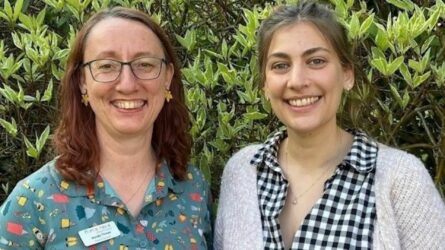Linley & Simpson Go the Extra 300 Miles for Martin House
Martin House partners Linley & Simpson aren’t afraid of a challenge when it comes to fundraising for their favourite cause. From tackling…
We have an ethos that our specialist knowledge is something to be shared. It means more children and young people can receive expert palliative care, not just at the hospice, but when and where they need it.
So education has a big role to play at the hospice, and as practice educators, we provide training both to our own staff and externally, all with the aim of ensuring the care needs of children and young people with complex, life-limiting conditions are met.
We have an ongoing programme of training, which we base on regular training needs analysis, to ensure we can build a relevant programme of education for the care team. This includes education we provide, but also bringing external experts where we need that input.
We also work in collaboration with our clinical nurse specialists and doctors, and there are also lots of care team staff who have specialist knowledge, so we support them to deliver training as well.
One of our great strengths is the diverse range of skills we have among the care team, so it’s good to give opportunities to share that knowledge, and we know that it’s something everyone values.
On top of the regular programme of education, we also respond to ad hoc needs. For example, children and young people often have very specialist pieces of medical equipment, and protocols for things like IV or ventilator maintenance can vary widely depending on the area they are from.
Our admissions nurses do a brilliant job of flagging to us when someone is coming to the hospice with a specific piece of equipment, so we can organise training for the team on how to use it.
It’s really important for us to keep on top of that kind of thing, as medical developments are made all the time, and we need to keep pace with that — learning is a lifelong journey.
As well as clinical skills, there are the softer skills we need in our jobs, so part of the work we do touches on those too. We spend a lot of time with families, so it’s about communication, being able to listen and have that level of professionalism and collaboration between teams.
Along with the education we provide to hospice staff, we also work externally across our region. We hold a lot of specialist knowledge, and sharing that with staff working in hospitals and the community helps children and young people receive the best care where it is needed.
Sometimes that might be in response to a particular case — for example, our clinical nurse specialists might be supporting a hospital team with end of life care for a patient, and we can go in afterwards to offer supervision support and talk to them about any educational needs that have arisen from that experience.
Part of this external training is also linked to extending our reach, so NHS colleagues understand when and how they can refer patients to us for palliative care, by helping them understand our referral criteria and the services we offer.
We also go into universities to provide teaching, and as a hospice, we also host student nurses on placements, while our doctors support medical students in their training.
While our roles are as practice educators, we are both nurses first and foremost, and we still support on the care team, providing that day-to-day care. It means we really understand the realities of nursing care, and bring that experience to our teaching, as well as bringing in external experts to enhance the team’s skills and knowledge, so we provide the best possible care.
Mandy Thorpe and Annie Reid, Practice Educators
For further information contact: media@martinhouse.org.uk

Martin House partners Linley & Simpson aren’t afraid of a challenge when it comes to fundraising for their favourite cause. From tackling…
As Father’s Day approaches, we acknowledge this can be a profoundly difficult time for many, especially for dads who have experienced the…
At Martin House, we are always touched by the incredible support we receive from our community. One such act of kindness has…